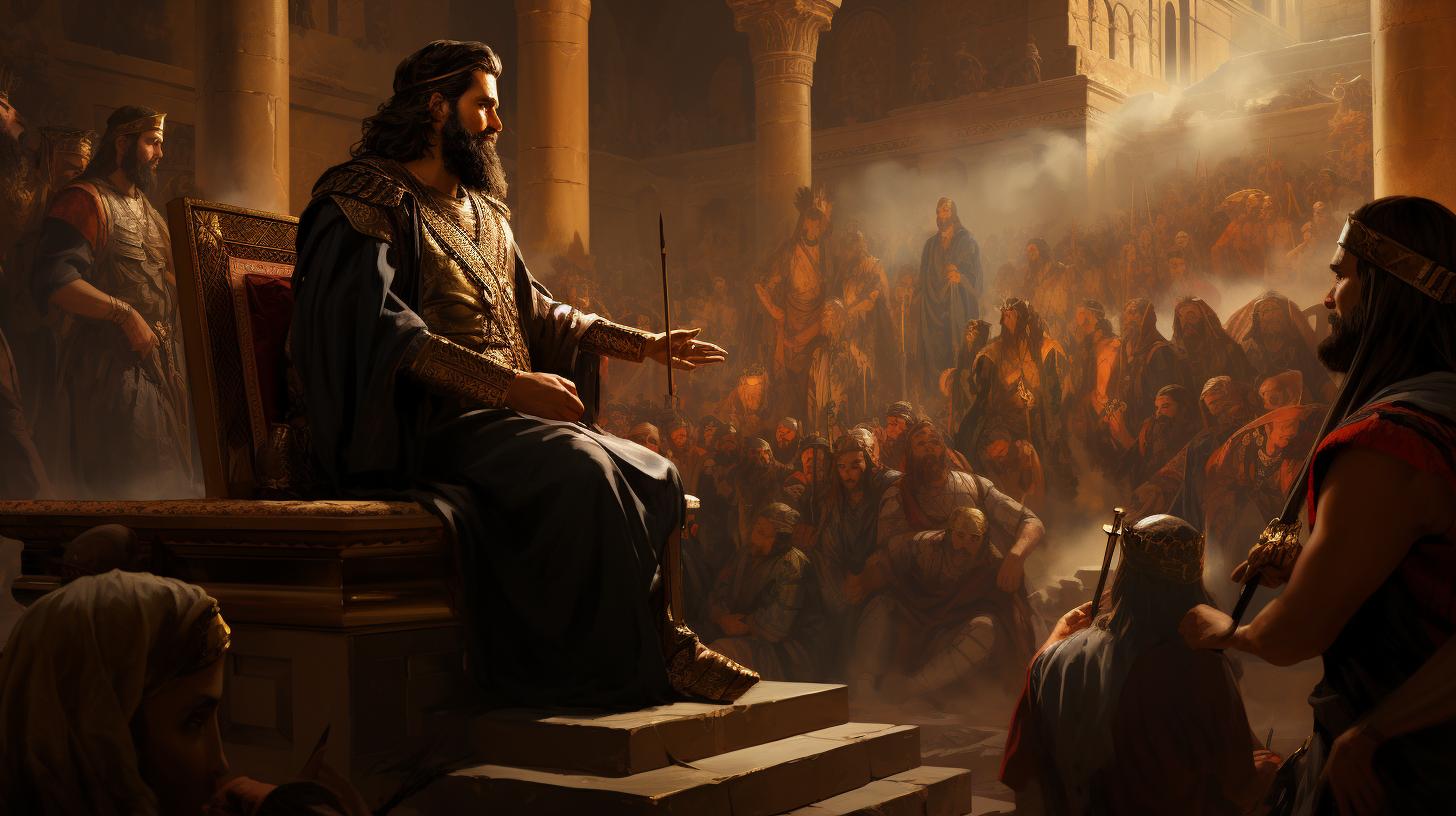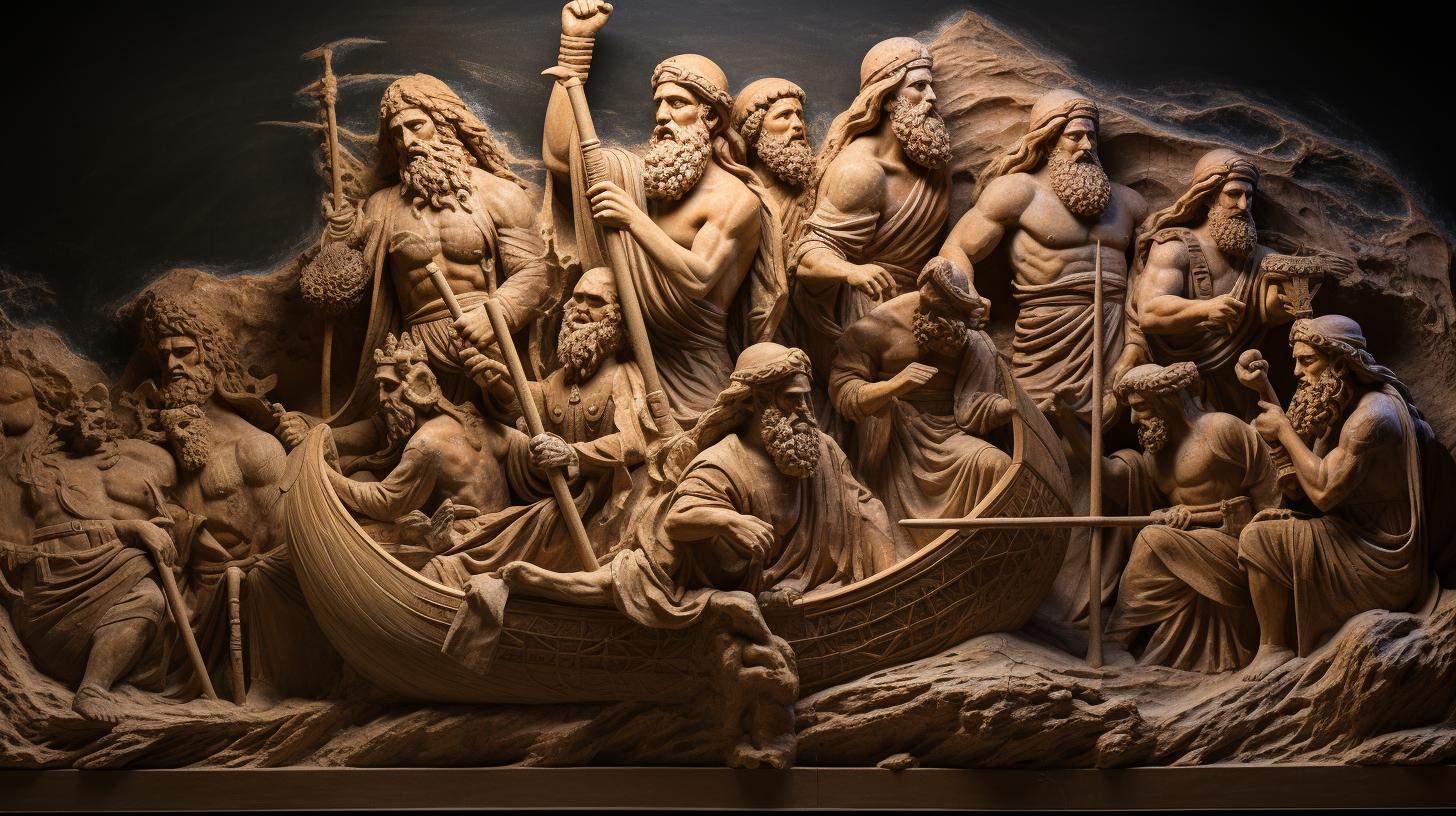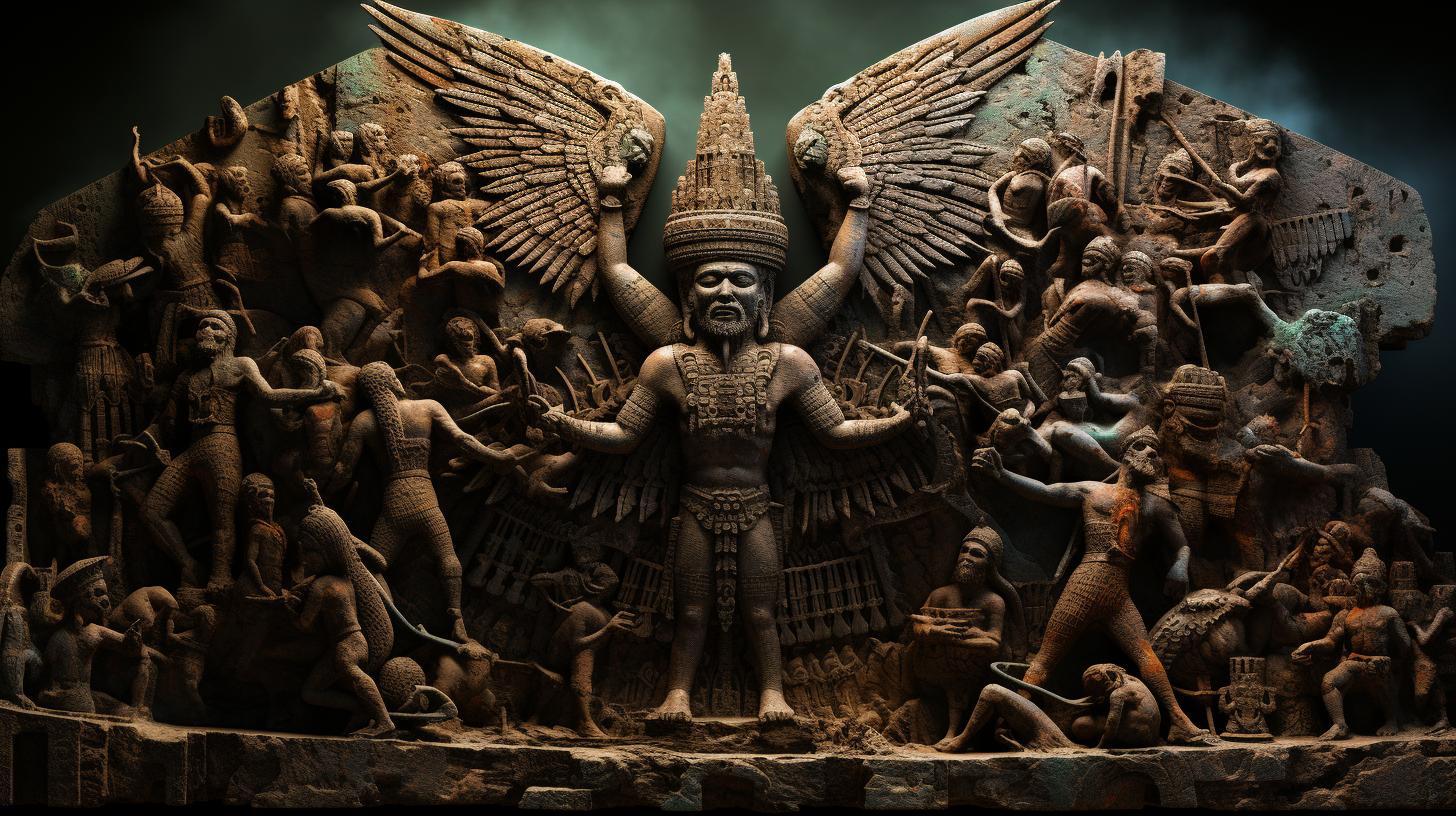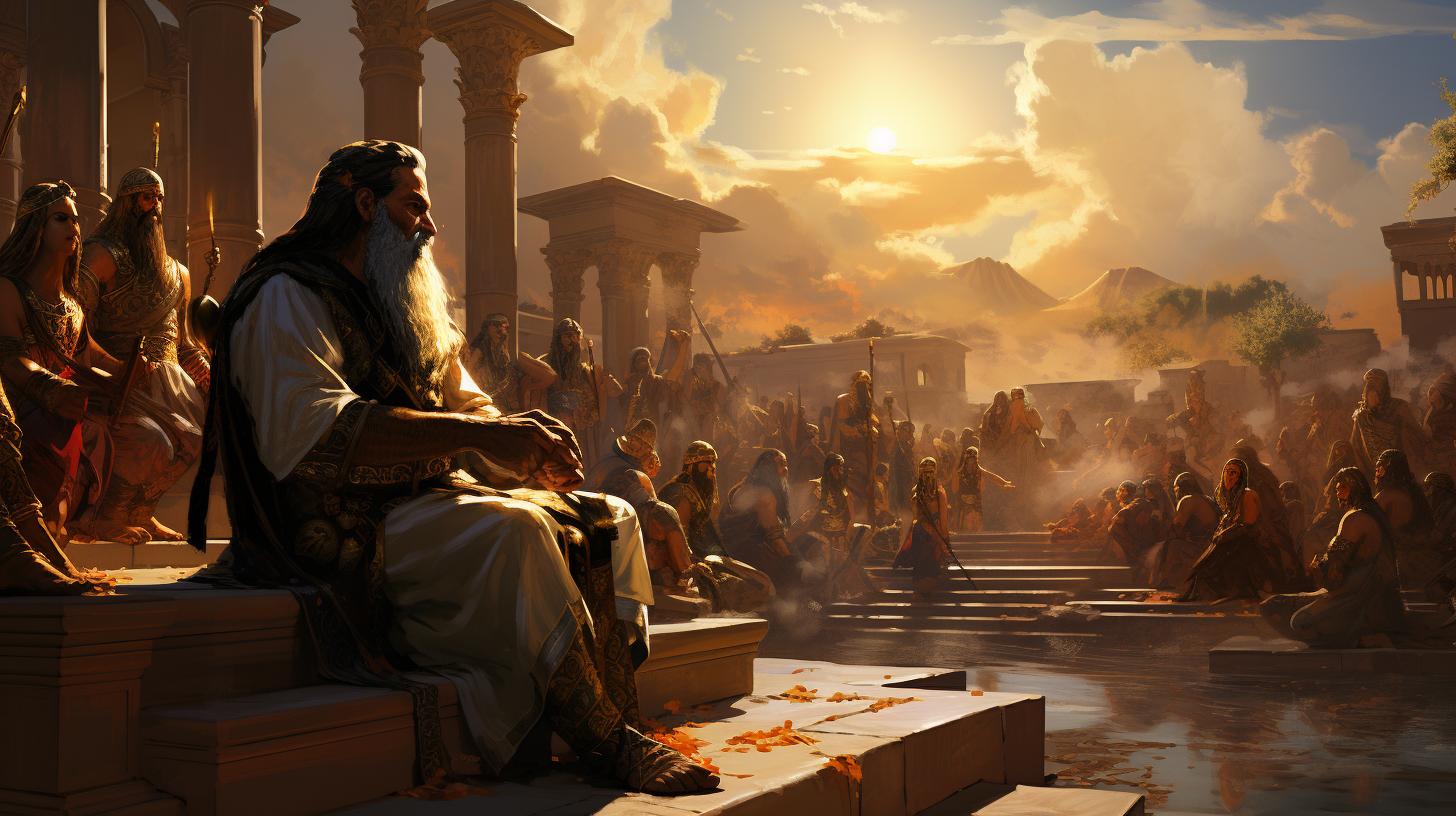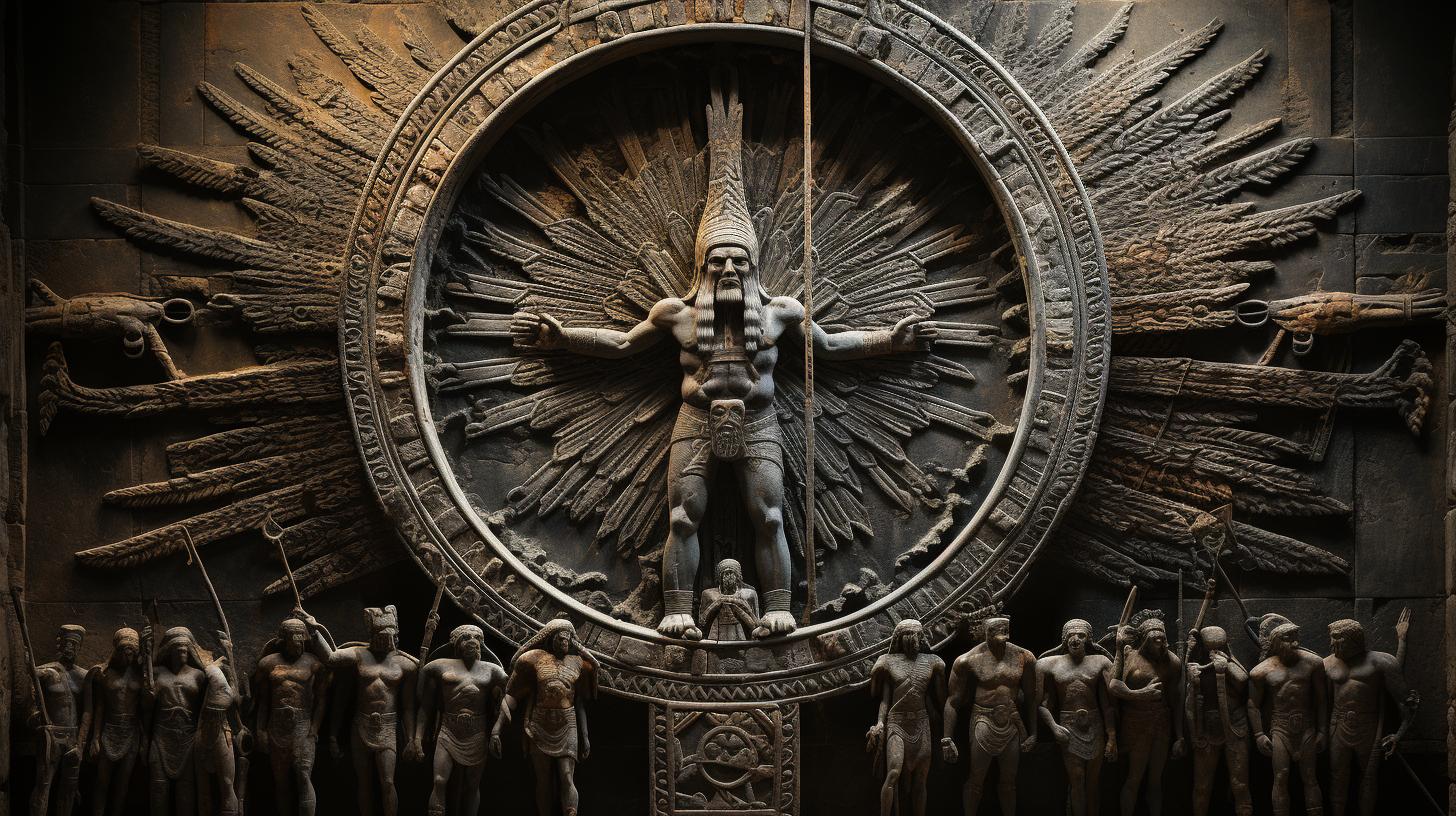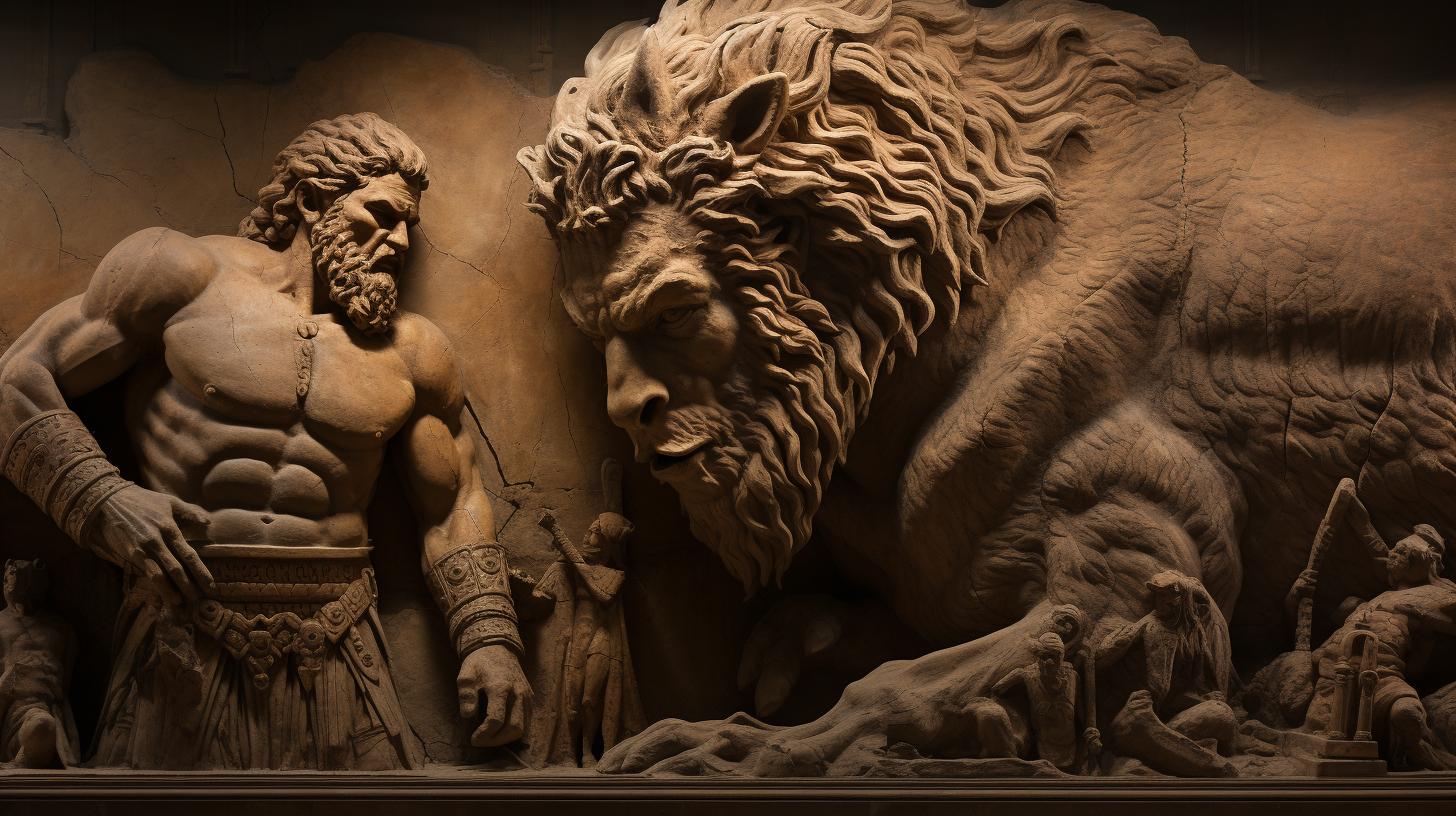Overview of Adad Mesopotamian God

Adad, also known as Ishkur in Sumerian mythology and Hadad for the Canaanites, is the ancient Mesopotamian god of the weather. He holds a dual role, both as giver and destroyer of life.
His beneficial rains bring abundance, while his storms and hurricanes bring darkness and scarcity. Adad is venerated in various Mesopotamian cities and is associated with oracles, divination, and the worship of vegetation.
With lightning and thunder as his symbols, Adad also plays a role in war and the transfer of royal power. Today, we explore the significance and worship of Adad in ancient Mesopotamian culture.
Overview of Adad Mesopotamian God
Importance and Role of Adad
Adad, the Mesopotamian god, holds significant importance in ancient Mesopotamian culture. He is revered as a deity with a dual role, simultaneously embodying both life-giving and destructive forces. Adad’s ability to bring beneficial rains and abundance to the land highlights his vital role in sustaining agriculture and food production in Mesopotamia.
However, his storms and hurricanes bring darkness, scarcity, and death, showcasing his destructive aspect. Adad’s duality as a giver and destroyer of life played a crucial role in the ancient Mesopotamian belief system, highlighting the delicate balance between prosperity and chaos.
Worship and Beliefs Associated with Adad
The worship of Adad was widespread across Mesopotamian cities, reflecting the profound impact he had on people’s lives. Devotees believed that by appeasing Adad through various rituals and offerings, they could ensure a bountiful agricultural yield and protection against natural calamities.
Adad’s association with oracles and divination practices indicates the belief in his ability to provide guidance and prophetic insight. The belief that Adad’s death caused drought and his subsequent resurrection brought prosperity showcases the significance of his worship in the context of agriculture and fertility cults.
The symbol of lightning and thunder used to represent Adad in monuments and seals further exemplifies the reverence and awe associated with his worship.
Adad in Mesopotamian Mythology
Adad, the Mesopotamian god of weather, held a prominent position in the ancient pantheon. This section explores various aspects of Adad’s role within Mesopotamian mythology, including his origins, family connections, dual nature, and symbolism and sacred elements associated with him.
Origins and Family of Adad
Adad’s lineage traces back to Anu, the god of the sky, and he is also considered the offspring of Bel, the deity of the atmosphere. As the son of these esteemed divinities, Adad occupies a significant position in the Mesopotamian divine hierarchy.
His divine heritage lends him immense power and influence over the natural elements.
Dual Nature of Adad: Giver and Destroyer of Life
One of the distinctive aspects of Adad’s character is his dual nature as both a giver and destroyer of life. While his benevolent rains ensure fertile lands, abundant harvests, and prosperity, his wrathful storms and hurricanes can bring about darkness, scarcity, and even death.
This duality reflects the cyclical nature of life and the delicate balance in the natural world that Adad governs.
Symbolism and Sacred Elements Connected to Adad
Adad’s symbolism is represented by the cypress tree, which holds deep spiritual significance in Mesopotamian culture. Additionally, the number six is revered as sacred to Adad. Animals such as the bull and the lion are considered sacred to him, symbolizing his power, strength, and dominion over the natural forces.
Adad’s association with lightning and thunder manifests in artistic representations, where he is depicted with lightning bolts and storm clouds, emphasizing his role as the god of storms.
In conclusion, Adad’s place in Mesopotamian mythology is characterized by his celestial lineage, his dual nature as a giver and destroyer of life, and the symbolism associated with him.
Understanding Adad’s origins, family connections, and symbolic elements provides insight into the Mesopotamians’ perception of natural phenomena and their belief in the intricate balance between prosperity and destruction in the hands of this powerful deity.
Adad’s Role in the Mesopotamian Society
Adad played a crucial role in ancient Mesopotamian society, where he was revered for his power over storms and natural phenomena. As the god of storms, he was believed to control thunder, lightning, and rainfall.
The Mesopotamians saw his influence in the changing seasons and the fertility of their lands.
Adad as the God of Storms and Natural Phenomena
Adad’s role as the god of storms was central to the Mesopotamian belief system. They believed that through his divine control, he could bring beneficial rain and prosperity to the land.
The Mesopotamians depended on agriculture for their sustenance, so the ability of Adad to provide rainfall was of utmost importance. They saw his storms as both a blessing and a source of potential destruction.
The Mesopotamians also associated Adad with other natural phenomena such as thunder, lightning, and even hurricanes. They believed that these acts of nature were an expression of his power and influence.
Adad’s control over these forces instilled both awe and fear in the hearts of the Mesopotamians, as they recognized his ability to shape their environment.
Adad’s Influence in Agriculture and Food Production
The agricultural sector in Mesopotamia heavily relied on Adad’s favor for successful harvests.
The timely arrival of rainfall was seen as a direct result of his protective role, ensuring sufficient water for crops to grow. This connection between Adad and agriculture highlights his importance in sustaining the livelihoods of the Mesopotamian people.
Furthermore, the Mesopotamians believed that Adad’s storms had the power to replenish the earth’s fertility. The rain and subsequent flooding brought by his storms were seen as necessary for rejuvenating the soil, making it more fertile for future cultivation.
Adad’s Connection to War and Leadership
Besides his association with the elements, Adad played a significant role in the realm of warfare and leadership. The Mesopotamians believed that Adad determined the outcome of battles and wars, granting victory to those who garnered his favor.
As the god of storms and lightning, his intervention was seen as decisive in the outcome of conflicts.
Moreover, Adad’s connection to leadership extended beyond the battlefield. The Mesopotamians believed that he had a role in the succession of kings and the transfer of power.
Adad was seen as a divine force that bestowed kingship upon chosen individuals, ensuring the continuity and stability of their society.
- Adad’s storms were seen as a blessing for agricultural prosperity.
- He controlled thunder, lightning, and rainfall.
- His storms were both a source of awe and potential destruction.
- Adad’s favor was crucial for successful harvests and food production.
- Rainfall and flooding brought by his storms rejuvenated the soil’s fertility.
- Adad was believed to determine the outcome of battles and wars.
- He played a role in the succession of kings and the transfer of power.
Adad’s Worship and Temples in Mesopotamia
Adad, the powerful Mesopotamian god of storms, was widely venerated in various cities across the region.
His worship was deeply ingrained in the religious practices of Mesopotamia, where magnificent temples were built in his honor.
Adad’s Veneration in Different Mesopotamian Cities
The worship of Adad was not confined to a single city; rather, it extended throughout Mesopotamia. In the city of Babylon, the center of religious and political power, Adad held a prominent position.
Temples dedicated to Adad, such as the Ekur in Nippur and the Eshumesha in Ashur, offered sanctuaries for the devout followers of the storm god.
In the southern city of Uruk, Adad was revered as the provider of life-sustaining rains, and his temple, known as Eanna, stood as a testament to his influence.
The city of Larsa also boasted a magnificent temple dedicated to Adad, reflecting the widespread veneration of the god.
Rituals and Offerings Associated with Adad’s Worship
The worship of Adad involved a variety of rituals and offerings aimed at appeasing the god and seeking his blessings. These rituals included prayers, processions, and the performance of sacred rites by priests and priestesses.
Offerings such as grains, fruits, and livestock were presented to Adad in the hope of gaining his favor and receiving abundant rains. In times of drought or impending storms, special rituals and sacrifices were performed to appease the wrathful side of Adad and seek his protection against destructive forces.
Adad’s Relationship with Oracles and Divination Practices
Adad held a significant role in the realm of oracles and divination in Mesopotamian society. The god was believed to possess the power to reveal insights and predictions through various divination practices.
Diviners sought Adad’s guidance and interpreted signs from thunderstorms, lightning bolts, and celestial phenomena, believing them to be messages from the god. Adad’s intimate connection with nature made him a vital source of knowledge and foresight for the people of Mesopotamia.
- Adad’s temples served as centers for oracular consultations, where diviners interpreted the will of the god and provided guidance to the seekers.
- Divination practices involving the examination of animal entrails, celestial omens, and dream interpretation were also associated with Adad.
- The insights gained from these divination practices played a crucial role in decision-making, personal guidance, and even political matters.
In conclusion, the worship of Adad in Mesopotamia revolved around magnificent temples that dotted the landscape of various cities.
Rituals and offerings were performed to appease the god and seek his blessings. Adad’s association with oracles and divination practices provided vital guidance and foresight to the ancient Mesopotamians, making him an integral deity in their religious and social lives.
Adad in Modern Understanding and Study
Adad Mesopotamian god continues to have a significant impact beyond ancient Mesopotamia, influencing various religions and cultures.
Influence of Adad in Other Religions and Cultures
Adad’s prominence extends beyond Mesopotamian mythology, as his characteristics and roles have found parallels in other religions and cultures. In ancient Canaan, he was worshipped as Hadad, the god of fertility and storms.
His association with weather phenomena and dual nature has also been noted in neighboring cultures, such as Phoenicia and Syria.
Archaeological Discoveries and Artistic Representations of Adad
Extensive archaeological research and discoveries have shed light on Adad’s worship and significance in ancient Mesopotamia. Temples dedicated to Adad have been uncovered, providing insights into the rituals and practices associated with his veneration.
Archaeologists have also unearthed numerous artifacts, including statues and seals, depicting Adad’s representation and power over storms and natural forces.
Artistic representations of Adad showcase his anthropomorphic appearance, often portrayed with lightning bolts and other symbols of his weather-related authority.
These depictions highlight the importance of Adad in Mesopotamian art and reinforce his role as a divine figure connected to the elements.
Significance of Adad in the Ancient Near East’s Mythology
Throughout the ancient Near East, Adad held a significant position in mythology.
His portrayal as a storm god and the bringer of rains made him a pivotal figure in the agricultural societies of the region. Adad’s influence on crops and food production was vital, as prosperity and abundance were believed to be linked to his favor.
The cycles of Adad’s seasonal activity reflected the cycles of life and death in the natural world.
Moreover, Adad’s connection to war and leadership further emphasized his importance in Mesopotamian society.
Ancient rulers sought to solidify their power by aligning themselves with Adad, often depicting their authority through imagery associated with storms and lightning, symbolizing their connection to divine forces.
.














